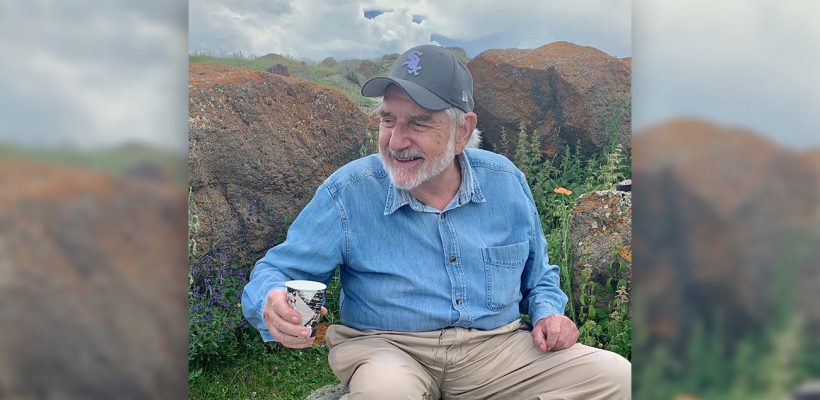
Gregory Areshian – The Legacy of a True Scholar
4 min readWritten by Dr. Armen Der Kiureghian, American University of Armenia President Emeritus and AUAC Board Member
On August 2, 2020, Armenia lost one of its most distinguished scholars, Dr. Gregory Areshian, professor of history and archaeology at the American University of Armenia (AUA). I had the privilege of knowing him and hiring him as a faculty member when I served as the President of AUA. I feel a deep sense of loss and sorrow upon his passing.
My first encounter with Dr. Areshian was in the summer of 1991, when Dr. Mihran Agbabian and I were in Yerevan working to establish AUA. The Government of Armenia had offered us rent-free use of a massive building, which previously served as the Congress Hall of the Communist Party. To formalize the transfer, we had to get the approval of the State Minister, who happened to be Dr. Gregory Areshian. I remember being extremely impressed by his impeccable English and enthusiasm for our project. He quickly signed all the necessary documents, but we stayed in his office longer and talked about the importance of bringing Western-style education to Armenia.
I met Dr. Areshian for the second time in 2004, when Professor David Stronach of the University of California, Berkeley, invited him for a seminar. At the time, Dr. Areshian was a visiting professor and researcher at the Cotsen Institute of Archaeology at the University of California, Los Angeles. A renowned archeologist of ancient Iran and Iraq, Stronach had an extremely high opinion of Dr. Areshian’s scholarship. Dr. Areshian visited Berkeley again around 2010 for another seminar, this time upon the invitation of Professor Stephan Astourian and as the guest of the Armenian Studies Program. The presence of archaeology scholars from UC Berkeley at the seminar again was a testament of the high regard he enjoyed in the field.
Dr. Areshian received his bachelor’s and master’s degrees from the Yerevan State University and his Ph.D. from the Saint Petersburg State University under Boris Piotrovsky, the renowned scholar of Urartian civilization and long-time director of the Hermitage Museum. Professor Areshian was proficient in nine languages, including Urartian cuneiform.
A few years after our visit to his office in 1991, Dr. Areshian had a conflict with Vano Siradeghyan, who served as the Minister of Internal Affairs in Levon Ter Petrosyan’s government and was later charged with criminal conduct. Dr. Areshian was forced to resign and leave the country. He settled in the United States and soon started teaching, first at the University of Chicago and later at the University of California, Los Angeles. In 2015, he decided to return to Armenia. I was elated to hire him as a professor in the College of Humanities and Social Sciences, which was a major gain for AUA. He completely devoted his attention and time to teaching, research, and service to the University. One very important and highly appreciated service he rendered the University was organizing and leading tours to archaeological sites for major donors to AUA.
He taught some of the most popular and large classes at AUA on topics related to history and archaeology. Students loved his approach to teaching and how he engaged them in discussions. Every year he assigned several of his students as “guides” during the archaeological tours. The excitement of these students, many of whom majored in fields other than humanities or social sciences, and their dedication to Dr. Areshian, was palpable. I remember several students telling me that it was through Dr. Areshian’s courses that they truly learned and appreciated Armenian history.
Dr. Areshian was concerned about the way history was taught in schools and universities in Armenia. He believed that Armenian history should be taught as a part of world history and in the broader context of the history of other nations. He criticized the current approach as “teaching Armenian history for Armenians alone.” His students, some of whom had come to AUA from other universities and had experienced history courses elsewhere, attested to his innovative approach to the teaching of Armenian history, both in style and content.
I had the privilege of many conversations with Dr. Areshian about history, archaeology, and AUA programs, particularly the need for strengthening Armenian studies courses. My colleagues and I also had the privilege of going on several tours of archaeological and historical sites with him. The first one was to the Areni-1 cave in 2016, where the famous 6,000-year-old shoe and winery were discovered by a team led by Professor Areshian and Professor Boris Gasparian of the Institute of Archaeology and Ethnology of the National Academy of Sciences of Armenia. The second tour was to Carahunge or Zorats Karer (Armenia’s Stonehenge) near Sisian, where his students were mapping the tombstones and he intended to conduct excavations to better understand the origins of the graves. The last one was to northwestern Armenia, where we visited several sites, including the Dashtadem Fortress in Aragatsotn, Saint Gevorg Church in the village of Garnahovit, and the Marmashen Monastery complex near Gyumri. His knowledge of these monuments and archaeological sites, and his enthusiasm in explaining their backgrounds to us were so profound that it is difficult to imagine that he will not be leading tours anymore.
Armenia has lost one of its most important scholars. His legacy will go on to live in the rich body of scholarly books and articles he leaves behind and in the accomplishments of numerous students and research associates he inspired. May his light shine forever.
Photo courtesy of Dr. Narine Sarvazyan
Media Coverage:
[Mirror-Spectator] Tribute: Gregory Areshian – The Legacy of a True Scholar
